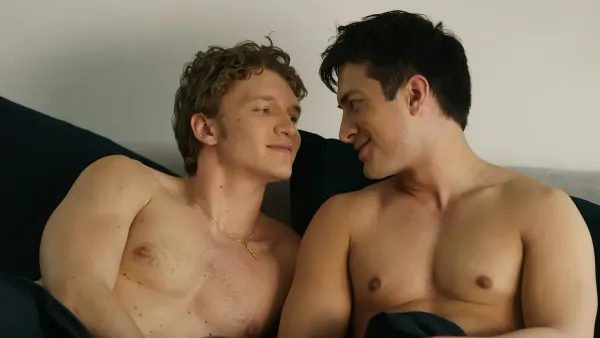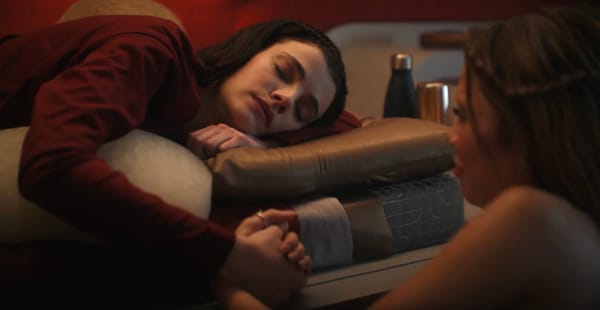Babylon Berlin: "Episode 1" and "Episode 2" (with Libby Hill)
In which Gereon Rath gets to Berlin, Lotte wears a great hat, and Emily finds a new favorite TV show
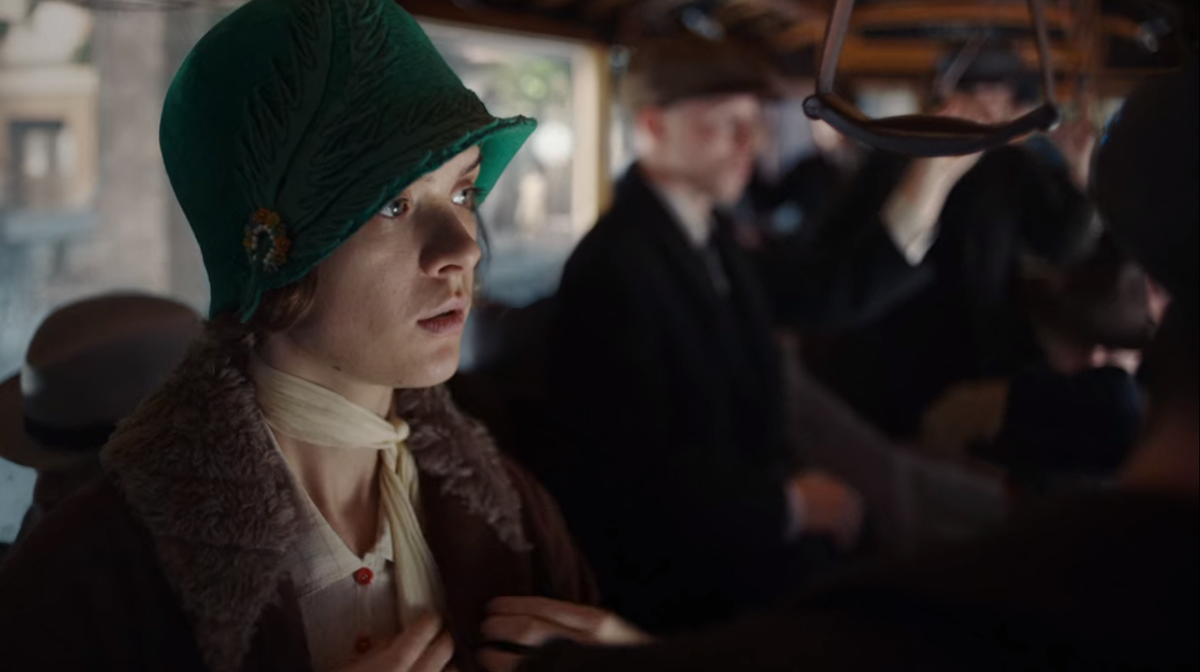
(For the foreseeable future — aka as long as this quarantine lasts — Emily will be watching the critically acclaimed German drama Babylon Berlin, a neo-noir set in 1929 Germany. The series is available on Netflix in the United States. For every installment, she will be joined by a special guest. Today’s guest is Indiewire TV Awards Editor Libby Hill, who also formerly cohosted the podcast TV on the Internet with Emily. Oh, and she and Emily are married too.)

Emily: Libby!
Libby: Em.
Emily: Babylon Berlin! I like it! I like it a lot! I've only seen two episodes, of course, but I was in from the moment Lotte put on her green hat, and I was half convinced I was watching one of the best TV shows ever made after that weird as hell musical number and following montage at the end of episode two.
I love how confident this is in its ability to tell a story visually. I love how when you said, "Does this show have any girl characters in it?" Lotte showed up literally three seconds later to prove that, yes, it has some amazing girl characters in it. I love how it's making me vaguely interested in a white guy protagonist with a troubled past. I love how it's incredibly patient, but you never feel like nothing is happening. Even the storylines I'm less interested in are interesting!
Tell me your thoughts. I think you went in more skeptical than me and came out raving as well.
Libby: People are pretty, and I like it.
Emily: I'm going to use "People are pretty, and I like it" as a tacit acknowledgement that you want to talk about the production values. So: What do you think of the production values?
Libby: While I can’t be bothered to look it up, I have to assume there’s already been plenty of virtual ink spilled online about how the series utilizes its production values to assist in its storytelling. But I don’t mind adding to that!
Take your beloved green hat, for instance. It’s a decadent color, a deep peacock green that appears almost lurid among the sepia-stained neutrals by which we visualize anything before, say, 1950. But that hat is working overtime, beyond being a beautiful piece of costuming. Affixed to protagonist, Lotte, it tells us that despite her circumstances, this is a woman who understands the value of accessorizing and the importance of standing out in a crowd.
And she does. When scrumming with other young women for day labor, the eyes of both the audience and nearby gentlemen are drawn to Lotte, not because she’s preternaturally beautiful, but because it’s the only differentiating aspect in a sea of gray. That’s something especially important to viewers, because at that early juncture of the series, it would be difficult to pluck the young woman out of the crowd. Give her an emerald hat and you can hardly tear your eyes from her.
That hat is only one example but it perfectly represents the economy of storytelling on the series, a universe which I’ve spent only 90 minutes in, but feel as though I’ve been living in for years.
That said, the show so far has reminded me how shallow my memories of world history are and the inherent failures of the public school systems. What about you? Did you find yourself scrambling to remind yourself of what exactly went down in Germany between the wars? Be honest.
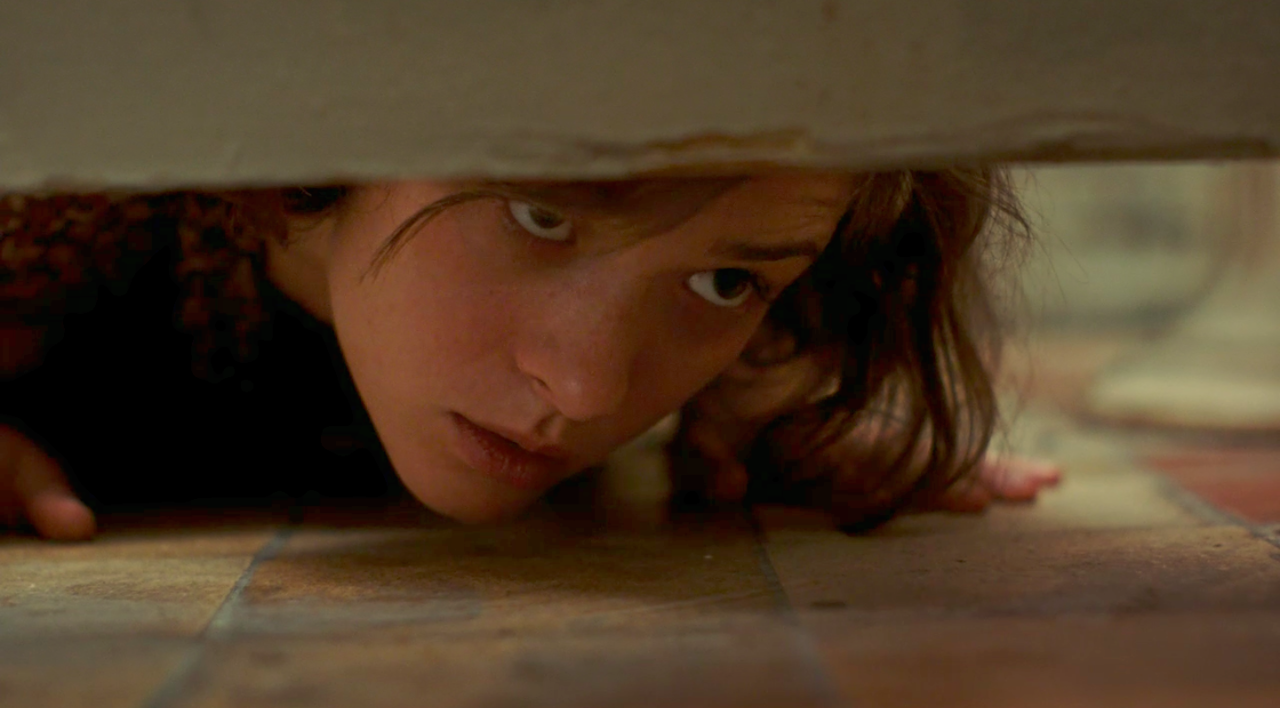
Emily: I’m really lucky, because I just got done reading Jason Lutes’s graphic novel Berlin, which is set in the same time period as Babylon Berlin — the final days of Weimer Germany. Lutes uses this period to tell a sprawling, Robert Altman-esque story about artists living and working amid the rise of fascism, one that keeps the decadence of Berlin society at the time off to the side while focusing on the people who are unsure how much to push back against the sweeping political changes shaping and warping their society.
But that means I am, for instance, aware that when Gereon is kicked out of his hotel because a bunch of people are coming in on May 1, I know that we’re headed to the bloody massacre called Blutmai, which set German society on a course that hastened the rise of the Nazis and made Communism more unlikable to polite society (despite the fact that those massacred on Blutmai were mostly Communists!). That kind of background — which the average German viewer would have as a matter of course — is helping me make my way through the thicket of Trotskyists and Stalinists and so on and so forth. (It’s intriguing to me how the Nazis themselves mostly aren’t a part of the story yet.)
But what’s incredible to me is that you don’t need to know any of this to understand the Weimer Republic, because now, nearly 100 years later, we’re living in a very similar world, with massive amounts of poverty, unsustainable income inequality, and the rise of both leftist politics on the one hand and fascism on the other. Babylon Berlin is one of those period pieces that is about the present without ever once tipping its hat to how it’s about the present, probably because the episodes we’re watching were filmed in 2016, when the rise of white nationalism in the West was a thing but not yet a massive public preoccupation by those of us on the Left, wondering the most effective way to combat it.
Like a lot of stories set during this time period — Cabaret, notably — Babylon Berlin invites you to be sucked in by its surface glitz and its genre affectations (this is, after all, a noir, with an involving detective story and a train heist and all kinds of fun things), while also making sure you notice everything that glamour covers up. It reminds me of Mad Men, though tonally, the two shows could not be more different.
I want to talk about that final montage in episode two — when I went all in on this show — but before we get there, I want to know what you think about Gereon himself and this show’s portrayal of PTSD, at least insofar as someone who went through World War I would understand it.
Libby: Again, this was something I thought the show was adept at handling and another way it reflects the reality of the modern day by underlining that some things never change.
We’re told right off the bat that the men World War I broke down are considered weak, which is why Gereon goes to such great lengths to keep his own symptoms locked down. The depiction of men left shell-shocked (literally) by their service time is excruciating. Soldiers came back from the war having seen things the world had never before experienced, and time and distance did them no favors. You see some of them gathered in a public square in these early episodes. They are missing limb. They are injured. They are looking for a helping hand, surrounded by people actively trying not to see them.
This isn’t so dissimilar from how we treat modern veterans who return from war in a different state from when they departed. Veteran services are underfunded and overlooked, perhaps because the country doesn’t like to look at the real-life consequences of war and other decisions made by a nation’s leaders, ostensibly on our behalf. To acknowledge the spirits and psyches destroyed by battle would force us to consider the true cost of war, something the United States hasn’t seen up close for 150 years, but something Germany in 1929 was all too familiar with.
Plus, having the protagonist trying to repress his own trauma is incredibly effective at pinning the show’s audience to that perpetual frailty, making them as anxious about Gereon’s secret getting out as he is.
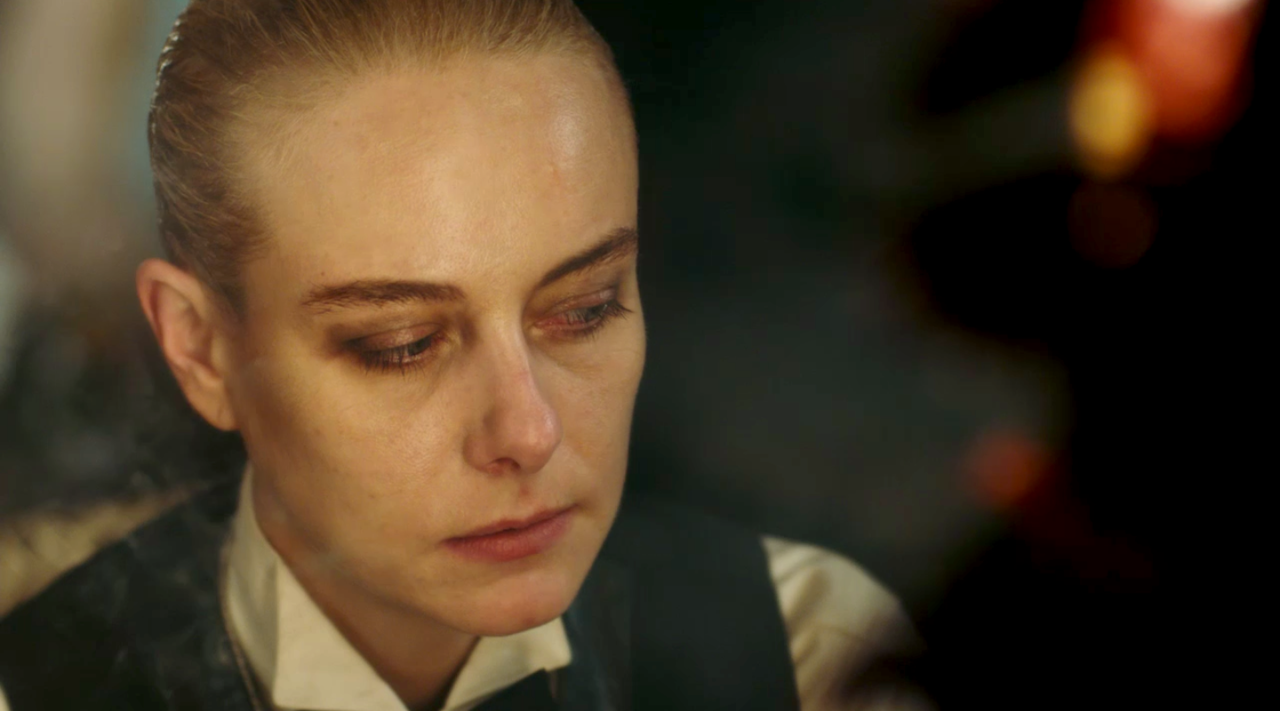
Emily: When Lotte happens upon him in the bathroom and dribbles the morphine (I assume?) between his lips, it’s a charged moment. An intimacy develops between them almost instantly. They’ve made a pact, the two of them, without even realizing it, and it’s a pact only underlined by the fact that one of Lotte’s photos of a horrible crime scene gets mixed in with the nudes Gereon gives to his contact — their business is all mixed up in each other’s business now, and good luck separating the two.
Really, the entirety of the second episode creates this idea that little ripples in one storyline might have huge effects over in another. The closing montage, which begins with a mysterious drag king singer (later revealed to be Svetlana, who uses this guise to pass secret messages to the Soviets trying to track down the Trotskyist cell she’s infiltrated) performing an incredibly strange song about love and death, while everybody in the club dances along in a strange choreographed rhythm, pulls essentially every strand in the show together in a way that suggests there’s a common purpose uniting them, even if it’s not clear to us yet.
Here, even if you haven’t seen this show, just watch it. It rules.
You can almost believe this is happening, except, like, in what world would this be happening? That’s the Venn diagram intersection this show lives in, and immediately after the song ends, another montage sets more plates to spinning, with barely any dialogue to speak of. Trotsky’s followers are gunned down as Sergey watches (he escapes death by hiding in an outhouse pit). Lotte is supplementing her income with sex work. The singer is just Svetlana. It’s a bunch of reveals, but they’re paced so confidently that you barely notice how much the series is shifting its status quo.
Anyway, this montage rules. Everything about this show rules. Libby? Final thoughts? What do you think that film is all about?
Libby: The film is a neat way to showcase many of the themes of the show. It’s a showcase for the libertine era but also an encapsulation of the pervasive issue of extreme income inequality, how power follows money, and how both power and money seem to weigh on the rich to the extent that it drives them to pay money to become powerless, even for a moment. It’s fucked, honestly.
But this show has a lot of wieners and I appreciate the equal-opportunity nudity.
Emily: Thank you for concluding your contributions to this recap with wieners, Libby. It’s the thoughtfulness that drew me to you in the first place.
One last thing: I really want a paternoster (the elevators that never stop that are in the Berlin police headquarters) installed in our apartment building. It feels like a great way to get around, and honestly, I’m ready for it to come back.
Next time: Episodes three and four, and I’ll be joined by another special guest!! Check this show out, everybody. It’s great!


